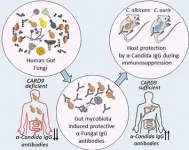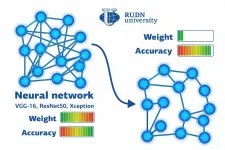Tom Hanks' COVID-19 diagnosis likely shaped behaviors, thoughts toward virus
2021-02-05
(Press-News.org) UNIVERSITY PARK, Pa.-- When actor Tom Hanks announced his COVID-19 diagnosis on March 11, 2020, many Americans were still learning about the virus and its severity. According to new research, Hanks' announcement may have affected how some people understood the virus and their behavior toward its prevention.
The day after Hanks posted the news on social media, Jessica Gall Myrick, an associate professor in the Donald P. Bellisario College of Communications at Penn State, and Jessica Fitts Willoughby, associate professor at Washington State University, surveyed 682 people about their attitudes and behaviors toward COVID-19.
Just under 90% of the people surveyed had heard about Hanks' social media posts saying he contracted the virus, and approximately half of that group reported it changed their attitudes and behaviors. The results were published in the journal Health Communication.
"There is a growing body of research about how celebrity behavior and social media posts can affect public health," Myrick said. "This research was different in that we were able to launch our study really fast and collect survey data within a day of Hanks posting about his diagnosis."
According to the study, the people who had heard the news reported Hanks' diagnosis "highlighted the reality of COVID-19" and broadened their understanding of not only the severity of the situation, but also their susceptibility to the illness.
Nearly half of the participants who had heard the news when surveyed reported a range of emotional responses, according to the study. Responses included "surprise, fear, anger, sadness and hope." The respondents who reported making changes said Hanks' disclosure inspired them to seek more information and/or take stricter precautions.
"Celebrities can have a huge reach, often more so than typical scientists or doctors or the health department," Myrick said. "If they are encouraging positive health behavior change, then it can serve as a de facto public health intervention."
The half of respondents who heard the news and said Hanks' diagnosis did not change their thoughts or behaviors reported thinking the actor would recover from the illness. They also noted they were already aware of COVID-19 and its effects and did not think Hanks' announcement changed their outlook or intentions regarding the virus.
The researchers conducted a statistical analysis to see if and what characteristics could predict whether people's attitudes and behaviors changed after learning Hanks' diagnosis. The results indicated that people who identified with Hanks or said they knew him were more likely to change their thoughts or COVID-related behaviors due to the announcement.
"People who said they typically trust celebrities, friends, family, or Donald Trump for health information were more likely to say that Hanks' announcement led to positive behavior change," Myrick said. "This suggests that public health officials and advocates may want to use these types of celebrity announcements to help reach people who may be harder to reach. They don't rely as much on news or on scientists for health information."
Because the study was launched so quickly -- the day after the announcement -- the researchers were able to talk to some people who had not yet heard the news. Nearly 4% of respondents reported not hearing the news about Hanks' diagnosis. The researchers showed half of these participants the Facebook post where Hanks announced his COVID-19 diagnosis and the other half a non-COVID Hanks post.
The researchers found one notable difference among these groups. Those who read the COVID-19 post said they felt less capable of avoiding the virus compared to the group who read the non-COVID-related Facebook post. It could be that learning of Hanks' diagnosis, despite his wealth and resources, resulted in people thinking that if Hanks could not avoid COVID-19 then they may not be able to, either, said the researchers.
Myrick is affiliated with the Science Communication Program, a program in the Bellisario College that supports research in the science of science communication. Willoughby is an associate professor at the Edward R. Murrow College of Communication at Washington State, where she is a member of the strategic communications department.
INFORMATION:
ELSE PRESS RELEASES FROM THIS DATE:
2021-02-05
Virtual reality isn't just for gaming. Researchers can use virtual reality, or VR, to assess participants' attention, memory and problem-solving abilities in real world settings. By using VR technology to examine how folks complete daily tasks, like making a grocery list, researchers can better help clinical populations that struggle with executive functioning to manage their everyday lives.
Lead author Zhengsi Chang is a PhD student that works in the lab of Daniel Krawczyk, PhD, deputy director of the Center for BrainHealth®. Along with Brandon Pires, a researcher at Texas Tech University Health Sciences Center, the team investigated whether VR can be used to effectively test ...
2021-02-05
New research affirms a unique peptide found in an Australian plant can destroy the No. 1 killer of citrus trees worldwide and help prevent infection.
Huanglongbing, HLB, or citrus greening has multiple names, but one ultimate result: bitter and worthless citrus fruits. It has wiped out citrus orchards across the globe, causing billions in annual production losses.
All commercially important citrus varieties are susceptible to it, and there is no effective tool to treat HLB-positive trees, or to prevent new infections.
However, new UC Riverside research shows that a naturally occurring peptide found in HLB-tolerant citrus relatives, such as Australian finger lime, can not only kill the bacteria that causes the disease, it can also activate the plant's ...
2021-02-05
Common fungi, often present in the gut, teach the immune system how to respond to their more dangerous relatives, according to new research from scientists at Weill Cornell Medicine. Breakdowns in this process can leave people susceptible to deadly fungal infections.
The study, published Feb. 5 in Cell, reveals a new twist in the complex relationship between humans and their associated microbes, and points the way toward novel therapies that could help combat a rising tide of drug-resistant pathogens.
The new discovery stemmed from work on inflammatory bowel disease, which often causes patients to carry larger than normal populations of fungi in their guts. ...
2021-02-05
To arrive at Nunavut, turn left at the Dakotas and head north. You can't miss it--the vast tundra territory covers almost a million square miles of northern Canada. Relatively few people call this lake-scattered landscape home, but the region plays a crucial role in understanding global climate change. New research from Soren Brothers, assistant professor in the Department of Watershed Sciences and Ecology Center, details how lakes in Nunavut could have a big impact on carbon dioxide levels in the atmosphere, and it's not all bad news--at least for now. Brothers examined 23 years of data from lakes near Rankin Inlet. He noted a peculiarity--as the lakes warmed, their carbon dioxide concentrations fell. ...
2021-02-05
A team of mathematicians from RUDN University found a way to reduce the size of a trained neural network six times without spending additional resources on re-training it. The approach is based on finding a correlation between the weights of neural connections in the initial system and its simplified version. The results of the work were published in the Optical Memory and Neural Networks journal.
The structures of artificial neural networks and neurons in a living organism are based on the same principles. Nodes in a network are interconnected; some of them receive a signal, and some transmit it by activating or suppressing the next element in the chain. The processing of any signal (for ...
2021-02-05
The discovery of an "Achilles heel" in a type of gut bacteria that causes intestinal inflammation in patients with Crohn's disease may lead to more targeted therapies for the difficult to treat disease, according to Weill Cornell Medicine and NewYork-Presbyterian investigators.
In a study published Feb. 3 in Cell Host and Microbe, the investigators showed that patients with Crohn's disease have an overabundance of a type of gut bacteria called adherent-invasive Escherichia coli (AIEC), which promotes inflammation in the intestine. Their experiments revealed ...
2021-02-05
Progressive vision loss, and eventually blindness, are the hallmarks of juvenile neuronal ceroid lipofuscinosis (JNCL) or CLN3-Batten disease. New research shows how the mutation associated with the disease could potentially lead to degeneration of light sensing photoreceptor cells in the retina, and subsequent vision loss.
"The prominence and early onset of retinal degeneration in JNCL makes it likely that cellular processes that are compromised in JNCL are critical for health and function of the retina," said Ruchira Signh, Ph.D., an associate professor in the Department of Ophthalmology and Center for Visual Science and lead author of the study which appears in the journal Communications Biology. "It is important to understand how vision loss is triggered in this disease, ...
2021-02-05
Washington, D.C.. -- The onset of the COVID-19 pandemic caused a sharp decline in living standards and rising food insecurity in developing countries across the globe, according to a new study by an international team of economists.
The study, published Feb. 5 in the journal Science Advances, provides an in-depth view of the health crisis's initial socioeconomic effects in low- and middle-income countries, using detailed micro data collected from tens of thousands of households across nine countries. The phone surveys were conducted from April through July 2020 of nationally and sub-nationally representative samples in Bangladesh, Burkina Faso, Colombia, Ghana, Kenya, Nepal, Philippines, Rwanda, and Sierra Leone. Across the board, study ...
2021-02-05
The largest single cell study to date of the childhood cancer, neuroblastoma, has answered important questions about the genesis of the disease. The researchers from the Wellcome Sanger Institute, Great Ormond Street Hospital (GOSH) and the Princess Máxima Center for Pediatric Oncology, discovered that all neuroblastomas arise from a single type of embryonic cell called sympathoblasts.
The study, published today (5 February 2021) in Science Advances, sought to understand why neuroblastomas range in severity, with some easy to treat and others having relatively low five-year survival rates. The fact that all neuroblastomas arise from sympathoblasts makes them an attractive ...
2021-02-05
Berkeley -- The onset of the COVID-19 pandemic last year led to a devastating loss of jobs and income across the global south, threatening hundreds of millions of people with hunger and lost savings and raising an array of risks for children, according to new research co-authored at the University of California, Berkeley.
The research, to be published Friday Feb. 5, 2021, in the journal Science Advances, found "staggering" income losses after the pandemic emerged last year, with a median 70% of households across nine countries in Africa, Asia and Latin America reporting financial losses. By April last year, roughly 50% ...
LAST 30 PRESS RELEASES:
[Press-News.org] Tom Hanks' COVID-19 diagnosis likely shaped behaviors, thoughts toward virus




